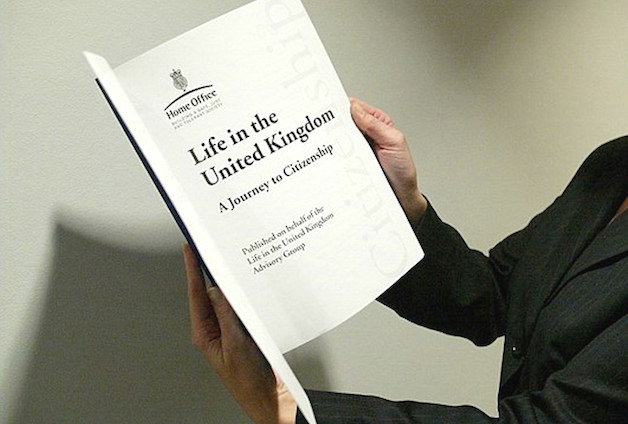Why applying for citizenship is an anxiety filled process – and not just for applicants
As we consider what post-Brexit citizenship might look like, it is crucial to understand the pervasiveness of anxiety and its integral role in shaping policy processes. Here, Anne-Marie Fortier discusses how anxiety is attached especially to English language ability for applicants, whilst also highlighting the role it plays for those on the other side of the process: the registrars checking applications for citizenship or settlement.

Credit: Paul Townsend CC BY-ND 2.0
Writing for The Guardian, Pakistan-born author Kamila Shamsie described how she never felt safe when she was applying for British citizenship: ‘I wasn’t prepared for the mutable nature of immigration laws, and their ability to make migrants feel perpetually insecure’. EU nationals have been feeling similar insecurities about their future status in Britain for months now. Brexit, of course, can only heighten such worries.
These experiences of insecurity resonate with that of many applicants I met in the course of my research on ‘becoming citizen’ in the UK. But those applying for citizenship or permanent resident status (known as ‘settlement’) are not alone in experiencing uncertainty and anxiety about citizenship and nationality rules: local authority registrars also at times feel anxious about the responsibilities and roles they are expected to fulfil as part of the citizenship attribution process.
Like many countries in Western Europe since the 1990s, Britain has undertaken a radical reform of its naturalisation measures. The revised process was put in place in 2004 and subsequent amendments followed in 2007, 2012, 2013, and 2016 (proposed). Today, applicants for settlement or citizenship must provide evidence of English fluency, complete the Life in the UK test (known as the ‘citizenship test’), and attend a citizenship ceremony when granted British citizenship.
The process of acquiring or attributing settlement or citizenship is riddled with anxiety in three interrelated ways: 1) anxiety is built into the process itself; 2) anxiety affects those who are involved in the process in different ways; and 3) anxiety ties into the reproduction of hierarchies of entitlement and belonging.
Building anxiety into the citizenship process
First, at the very heart of the requirement for immigrants to prove their English fluency and knowledge of ‘Life in the UK’ is an anxiety about ‘incursions’ of foreign cultures into the national domestic space. Since the summer of civil disturbances in Northern England in 2001, several British politicians have linked disaffection and risks of radicalisation among racial minority youths with ‘growing up in an English-free home’. These politicians include former Labour MP Ann Cryer in 2001, former Labour Home Secretary David Blunkett in 2002, as well as David Cameron at the start of this year.
Language and citizenship education should be available in order to provide new arrivals with crucial tools to facilitate their integration. But when language proficiency becomes politicised and conceived of as evidence of ‘integration’ rather than a tool for integration, it becomes the site where anxieties about protecting the ‘national culture’ are projected onto immigrants, residents or citizens with poorer or different English language skills. This lays the foundation for linguistic xenophobia that many have been subjected to for the past ten years, and which rose sharply in the immediate aftermath of the Brexit vote.
How anxiety affects different people within the application process
‘Khebat’ was a 27-year old Kurdish man from Iran when I met him in May 2013 in a private language school where he was taking a one-week intensive English language class to try to fulfil the language requirement for settlement. He had arrived as an asylum seeker in 2004 and was refused refugee status. He was living in Britain on a three-year leave to remain visa. As a ‘failed’ asylum seeker, Khebat knew he was ineligible for settlement. But he felt it unfair that a ‘friend’ who ‘don’t speak English’ passed the citizenship test and ‘got British’ (citizenship).
English fluency operates like a ‘checkpoint’ at the borders of citizenship rights, and Khebat internalised that logic. Khebat and many others (including applicants who are eligible for settlement) struggle to fit themselves into the policy. And a tension arises between how applicants read the requirements for English fluency and the way that the law reads them as perpetual outsiders regardless of their English fluency.
But it is not only applicants who are anxious about the securing of settlement or citizenship. Integral to citizenship processes is another anxiety about ‘fraudulent’ applicants, namely in the case of ‘sham marriages’ (or civil partnerships), which registrars have the statutory duty to report.
As part of the citizenship process, many local authority registrars (who deal with births, deaths and marriages) also provide optional services to settlement or citizenship applicants: the Settlement Checking Service (SCS) for applications for settlement on the basis of marriage (SET[M]), and the Nationality Checking Service (NCS) for citizenship applications. The role of registrars is to ensure that applications are complete and ready to be sent to UK Visa and Immigration, where decisions are made.
Conducting the SCS includes ensuring that couples have enough evidence of co-habitation. When I observed a training session about new SET(M) regulations in 2013, an extensive discussion arose about what counts as satisfactory evidence. Aside from the anxiety about getting it right, this discussion also revealed the limitations registrars see with the tools at their disposal to make a definitive assessment. The law operates in clear binary codes that separate the ‘genuine applicant’ from the ‘fraudulent applicant’ as if these were coherently and clearly gaugeable. But when faced with the much less coherent ways in which people organise their lives, registrars find themselves in the ambivalent position of exercising the state’s anxiety about ‘sham marriages’, while at the same time experiencing their own anxieties about the limits of the tools the state gives them to make that judgement and the fear of wrongly suspecting ‘genuine’ applicants.
Anxiety and hierarchies of belonging and entitlement
By attaching itself to linguistic competence, anxiety is projected onto individuals with perceived poorer or different English language skills who are judged according to a hierarchy of deservedness and belonging. Anxiety also attaches itself to bureaucratic processes that registrars find inadequate for distinguishing between ‘genuine’ and ‘fraudulent’ applicants.
Embedded in state practices such as citizenship attribution are anxieties about foreigners, such as those ‘not able to speak’ English and ‘not willing to integrate’ as David Cameron has stated, or foreigners who defraud the system. Such anxieties then recirculate among those who are variously involved in acquiring or attributing settlement or citizenship. However, the circulation of anxiety will have different effects on different subjects, as they are differently placed within the relations of power between the state and ‘foreigners’.
The pervasiveness of anxiety, and its integral role in shaping policy processes, is something then that needs to be studied in more depth; this is particularly the case as we consider what post-Brexit citizenship might look like.
—
Note: This review gives the views of the author, and not the position of the Democratic Audit blog, or of the London School of Economics. It originally appeared on the LSE British Politics and Policy blog. Please read our comments policy before posting.
—
 Anne Marie-Fortier is a Professor in the Department of Sociology at the University of Lancaster. Her work draws on citizenship studies, cultural studies, critical migration and diaspora studies, border studies and policy studies. This blog is based on her recent paper, ‘The psychic life of policy: Desire, anxiety and ‘citizenisation’ in Britain’ published in Critical Social Policy.
Anne Marie-Fortier is a Professor in the Department of Sociology at the University of Lancaster. Her work draws on citizenship studies, cultural studies, critical migration and diaspora studies, border studies and policy studies. This blog is based on her recent paper, ‘The psychic life of policy: Desire, anxiety and ‘citizenisation’ in Britain’ published in Critical Social Policy.





 Democratic Audit's core funding is provided by the Joseph Rowntree Charitable Trust. Additional funding is provided by the London School of Economics.
Democratic Audit's core funding is provided by the Joseph Rowntree Charitable Trust. Additional funding is provided by the London School of Economics.
Why applying for citizenship is an anxiety filled process – and not just for applicants https://t.co/AcWWMaT6Lt
Why applying for citizenship is an anxiety filled process – and not just for applicants https://t.co/L9IpIxlIB0
My new book Becoming British published with Biteback a few weeks ago provides additional research into this problem that may be of interest — https://www.bitebackpublishing.com/books/becoming-british
Why applying for citizenship is an anxiety filled process – and not just for applicants https://t.co/fptjd5tM8H
Why applying for citizenship is an anxiety filled process – and not just for applicants https://t.co/kOVWYemwMQ https://t.co/4knEX9QRjK